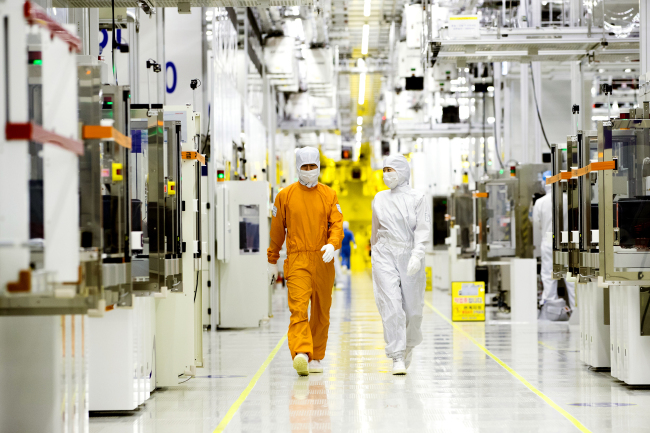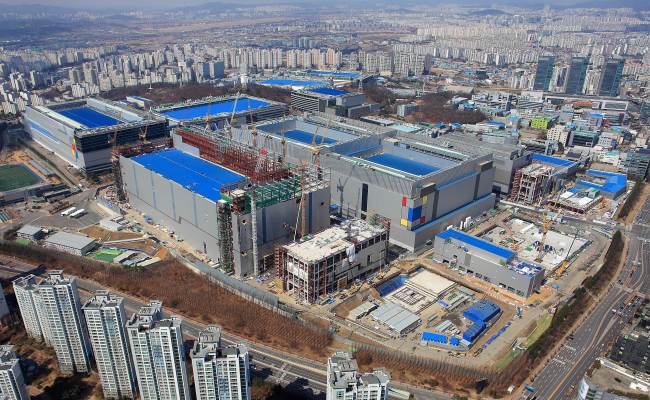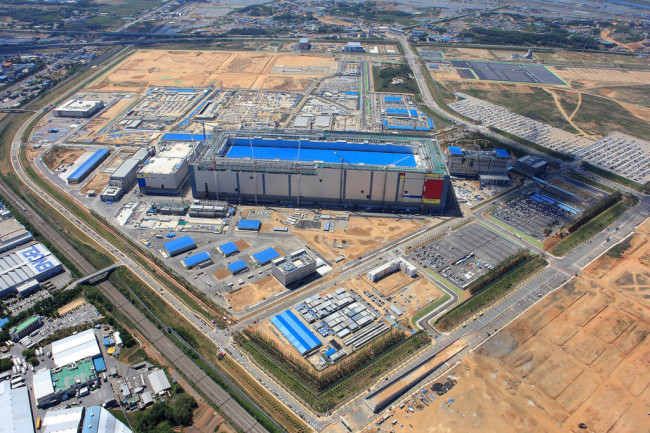Samsung aims to become No. 1 IDM by 2030 with W133tr investment
By Song Su-hyunPublished : April 24, 2019 - 13:38
Samsung Electronics said Wednesday that it would invest a total of 133 trillion won ($115.7 billion) by 2030 to become the world’s No. 1 integrated device manufacturer by strengthening its competitiveness in the foundry and system-on-chip segments.
The investment plan was announced a month after President Moon Jae-in ordered the government to take steps to boost the country’s competitiveness in the global non-memory market, amid growing worries about falling exports of memory semiconductors as the market entered a downward cycle.
The investment plan was announced a month after President Moon Jae-in ordered the government to take steps to boost the country’s competitiveness in the global non-memory market, amid growing worries about falling exports of memory semiconductors as the market entered a downward cycle.

According to the plan, “Semiconductor Vision 2030,” Samsung will create 15,000 jobs in the research and development and manufacturing sectors with a focus on systems-on-chips. The goals are to bolster its capabilities to design new cutting-edge chips for new technology applications, build actual products and release them on the market.
Of the 133 trillion won, 73 trillion will be spent on domestic R&D and 60 trillion will be allocated for production infrastructure.
“Under the plan, Samsung will invest 11 trillion won in SoC R&D and production facilities every year by 2030,” the company said. “This will indirectly create about 420,000 new jobs across the industry.”

Samsung also came up with a plan to support small- and medium-sized fabless companies in Korea, in line with the government’s efforts to create a favorable ecosystem for them.
The company will share its intellectual property assets -- in particular for interface, analog and security -- with fabless firms as well as tools and software programs to help product development.
Samsung will also lower technological barriers for small fabless companies, providing access to Samsung’s foundry facilities so they can manufacture their own products.
The semiconductor market is largely divided into two segments: memory and non-memory.
While the memory chip market accounts for about 30 percent of the chip market as a whole, the global market for non-memory chips has an estimated value of about 550 trillion won.
For the past couple of years, Samsung has been the world’s largest memory chip provider with a market share of over 40 percent. However, the company’s presence in the non-memory market has been weak at less than 5 percent.
Such overreliance on memory chips by Samsung and SK hynix presents a challenge for the export-driven Korean economy. Memory chips have been unrivaled export items for the past decade along with automobiles, displays, steel and petrochemicals.
But prices for Korea’s flagship memory DRAMs began declining in the fourth quarter of last year and continue to do so, shaving 20 to 30 percent off the value of Korea’s exports each month.
President Moon, last month, ordered policy measures to nurture the non-memory chip industry as part of a mid- to long-term plan to ensure the country’s industrial competitiveness.

The Ministry of Trade, Industry and Energy is currently working on the policy plan, which is expected to be announced by the end of this month.
Samsung is planning to hold a ceremony to mark both its investment and the government’s plan for the non-memory sector.
With the latest investment plan, Samsung aims to be a true IDM business -- a semiconductor company that is capable of designing chips and manufacturing the chips it has designed.
In the memory sector, both Samsung and SK hynix are IDM businesses that design and manufacture the most advanced DRAMs and NAND flash chips, but they lack such capabilities in the non-memory sector.
Unlike the memory business, which requires a mass-production infrastructure for a limited number of products, the non-memory business involves producing diverse types of chips on limited manufacturing lines -- these capabilities are essential.
“Samsung will take the lead in fostering the country’s competitiveness in the non-memory market by actively supporting small fabless and design house businesses,” a company official said.
By Song Su-hyun (song@heraldcorp.com)








![[Graphic News] More Koreans say they plan long-distance trips this year](http://res.heraldm.com/phpwas/restmb_idxmake.php?idx=644&simg=/content/image/2024/04/17/20240417050828_0.gif&u=)
![[KH Explains] Hyundai's full hybrid edge to pay off amid slow transition to pure EVs](http://res.heraldm.com/phpwas/restmb_idxmake.php?idx=644&simg=/content/image/2024/04/18/20240418050645_0.jpg&u=20240419100350)





![[From the Scene] Monks, Buddhists hail return of remains of Buddhas](http://res.heraldm.com/phpwas/restmb_idxmake.php?idx=652&simg=/content/image/2024/04/19/20240419050617_0.jpg&u=20240419175937)

![[KH Explains] Hyundai's full hybrid edge to pay off amid slow transition to pure EVs](http://res.heraldm.com/phpwas/restmb_idxmake.php?idx=652&simg=/content/image/2024/04/18/20240418050645_0.jpg&u=20240419100350)

![[Today’s K-pop] Illit drops debut single remix](http://res.heraldm.com/phpwas/restmb_idxmake.php?idx=642&simg=/content/image/2024/04/19/20240419050612_0.jpg&u=)